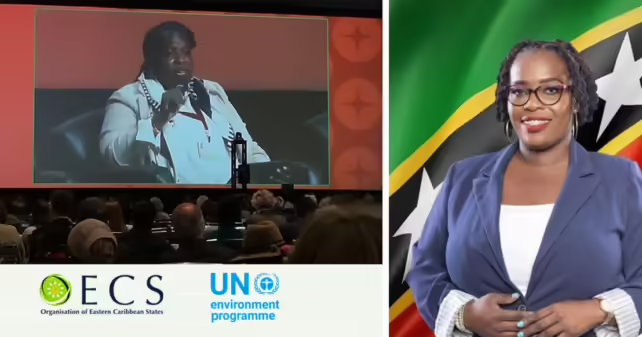
The fourth session of the Intergovernmental Negotiating Committee (INC-4) convened at the Shaw Center in Ottawa, Canada to develop a legally binding treaty to control plastic pollution, including in the marine environment. Small Island Developing States (SIDS), including Member States of the Organisation of Eastern Caribbean States (OECS), are making their voices heard at these high-level meetings taking place between April 23 and 29.
The OECS has joined the call of international negotiators for an ambitious, comprehensive, and all-encompassing United Nations treaty on plastics that addresses issues related to the whole lifecycle of plastics. Dr. Joyelle Trizia Clarke, Minister with responsibility for Sustainable Development, Environment and Climate Action, and Consultancy Empowerment in St. Kitts and Nevis, said to the delegates: “SIDS are considered the moral conscience and global voice on climate. The push for 1.5 to stay alive, the advocacy for the loss and damage fund led by Antigua and AOSIS must be brought to bear here in this conversation on plastics.”
It has been reported by the United Nations Environment Programme (UNEP) that between 70 to 95 percent of marine litter in the Caribbean Sea is from land-based sources, mostly plastics. This highlights the urgency of dealing with plastic pollution, especially for island nations. Furthermore, many waste and pollution issues are transboundary, which means that poor control and management in one country negatively affects neighbouring countries, potentially derailing their efforts at transitioning to blue economies.
This pollution not only destroys the marine ecosystem but also affects the economic activities of human beings depending on natural resources, which becomes a hurdle in the way of transitioning to sustainable blue economies.
In her address to meeting delegates, Dr. Clarke further outlined what SIDS aspire to in the negotiations. She stated that there should be “increased, amplified, and visible action on banning harmful plastics, just transition pathways, which can be shared and scaled up and built out in a way that honors and edifies local ingenuity. We must also bear commitment to co-designing, co-creating our stake, and co-determining our stake in a resilient future where each life and livelihood is protected and respected.”
In February 2022, at the resumed fifth session of the United Nations Environment Assembly, a historic resolution (5/14) was adopted to develop an international legally binding instrument on plastic pollution, including pollution in the marine environment, with the ambition to complete the negotiations by the end of 2024, and a robust financial mechanism, which advances just transition and provides specific support provisions for SIDS.
As these negotiations continue at the INC-4, the OECS Commission is represented by Susanna Scott, Officer in Charge of the Sustainable Ocean Management Programme, and Farzana Yusuf-Leon, Technical Officer. The team is hoping that there will be, at the core of the mechanism, a ban on harmful plastics and a pathway for a just transition to secure a sustainable future for people and our planet.

Disclaimer: The comments posted do not necessarily reflect the views of DominicaNewsOnline.com and its parent company or any individual staff member. All comments are posted subject to approval by DominicaNewsOnline.com. We never censor based on political or ideological points of view, but we do try to maintain a sensible balance between free speech and responsible moderating.
We will delete comments that:
See our full comment/user policy/agreement.